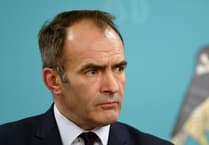The Manx Utilities Authority says its prices must go up as it has exhausted all other money-saving options.
It says its financial situation is nearing crisis point.
The state body, which supplies electricity and water, allowed its financial reserves to reduce in order to stop customer prices from jumping during the global spike in prices.
An MUA spokesperson said: ‘These options are now exhausted and tariffs need to increase so that Manx Utilities can continue to purchase energy for its customers.
‘Without a significant tariff increase we would expect what Manx Utilities owes (eg. debts) would exceed what it has (eg. cash, value of assets) within 12 months’ time.
‘However, Manx Utilities is required to make payments to its suppliers and currently cash being received from customers is lower than the cash we are paying out to suppliers and lenders.
‘Should this continue then Manx Utilities will have no cash left and will be unable to purchase gas (or other supplies) to continue to provide its essential utility services.’
When asked for clarification by the Manx Independent, the spokesperson said: ‘There are very limited reserves.
‘Our cash balances (bank balances) have reduced and are expected to continue to reduce, and there is not considered to be any surplus cash balances remaining to reduce tariff increases further.
‘We have withdrawn £25 million from the Bond Repayment Fund and are now reaching the minimum target fund value required to be able to repay the bonds.’
The MUA expects a deficit of £50 million and does not see another way out of this financial situation.
The spokesperson said: ‘We expect to have a deficit of around £50 million for the current year and would expect a similar level of deficit for next year without a significant tariff increase, even following the reductions in wholesale gas prices in recent months.’
The MUA has also used a forward purchase strategy (commonly known as hedging) to reduce consumer costs by £40 million.
When a person or company decides to ‘hedge’, they are basically insuring themselves against a negative event’s impact on their finances.
For example, if you buy homeowner’s insurance, you are hedging yourself against fires, break-ins, or other unforeseen disasters.
The MUA says it ‘has not stopped hedging however it has been difficult to forward purchase gas at affordable prices over the last year’.
It added: ‘There have also been times when forward contracts haven’t been available to purchase.
‘We continue to forward purchase when the market allows, but this is generally short-term and small quantities compared to prior to the energy crisis.’
A company spokesperson said: ‘Wholesale natural gas prices are now lower than they were in August 2022 but are expected to remain over 150 pence per therm for the coming 12 months.
‘Therefore, despite wholesale costs reducing they remain significantly higher than prior to summer 2021, with Manx Utilities’ wholesale energy costs for 2023-24 expected to be £45 million for local electricity supply.’
It was also offered a loan of £26million from the government to help stabilise prices for its customers, however it did not take the money.
The MUA spokesperson said: ‘The loan has not been drawn due to wholesale natural gas prices being lower than expected at the time and that using loans to temporarily reduce tariffs requires higher tariffs in the future, resulting in higher overall costs for customers.’
Earlier this week, the Chief Minister warned that finances would get tighter for people in the Isle of Man for a number of reasons.
He predicted that Manx Utilities would have no choice but to start raising prices substantially.
He continued: ‘I know that maturing fixed-term mortgage payments are going to be an immense shock to some.
‘Inflation, whilst perhaps peaking, is continuing to cause pressure on the cost of living and of course we continue to live with the global uncertainty created by a dangerous conflict on our doorstep.’
Between 2011 and 2021, gas prices averaged 50 pence per therm, however, since the Russian invasion of Ukraine, the prices continued to rise.
The peak was in February and August last year, when gas was 500 pence per therm.
We have approached chair of the MUA, and newly-appointed Minister for Enterprise, Tim Johnston MHK, for comment however, he was not able to get back to us before the Manx Independent went to press.


-(1).jpeg?width=209&height=140&crop=209:145,smart&quality=75)


Comments
This article has no comments yet. Be the first to leave a comment.